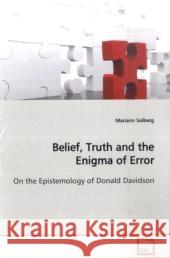Belief, Truth and the Enigma of Error : On the Epistemology of Donald Davidson » książka
Belief, Truth and the Enigma of Error : On the Epistemology of Donald Davidson
ISBN-13: 9783639150100 / Angielski / Miękka / 2009 / 184 str.
What are the basic conditions for knowledge? What are the prerequisites for understanding other human beings? What are the conditions for emergence of beliefs that can be true or false? Mariann Solberg discusses problems related to the American philosopher Donald Davidson's (1917-2003) views on belief, truth and error. Solbergs takes Davidson's thinking on these questions to be a version of naturalized philosophy. The possibility of error is a premise for a theory of linguistically formed knowledge. The book inquires to what extent we within the Davidsonian model of radical interpretation can give an account of error. The problem of explaining how error is possible has over time come to seem close to an enigma. Davidson has taken it that if we can explain error, we can explain intentionality. An explanation of intentionality would also be an explanation of the phenomenon of normativity. A solution to the problem of error would therefore be of great interest and have rich consequences. On a metaphilosophical level the analysis of Davidson s theory is employed to test the potential of a naturalized philosophical account of intentionality. What are the basic conditions for knowledge? What are the prerequisites for understanding other human beings? What are the conditions for emergence of beliefs that can be true or false? Mariann Solberg discusses problems related to the American philosopher Donald Davidson's (1917-2003) views on belief, truth and error. Solbergs takes Davidson's thinking on these questions to be a version of naturalized philosophy. The possibility of error is a premise for a theory of linguistically formed knowledge. The book inquires to what extent we within the Davidsonian model of radical interpretation can give an account of error. The problem of explaining how error is possible has over time come to seem close to an enigma. Davidson has taken it that if we can explain error, we can explain intentionality. An explanation of intentionality would also be an explanation of the phenomenon of normativity. A solution to the problem of error would therefore be of great interest and have rich consequences. On a metaphilosophical level the analysis of Davidson's theory is employed to test the potential of a naturalized philosophical account of intentionality.











